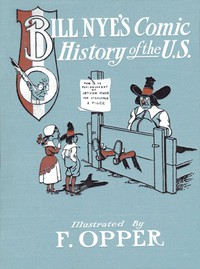Comic History of the United States by Bill Nye (book series for 10 year olds txt) 📗

- Author: Bill Nye
Book online «Comic History of the United States by Bill Nye (book series for 10 year olds txt) 📗». Author Bill Nye
This gave the then West to the English. They had tried for one hundred and forty years to civilize it, but, alas, with only moderate success. Prosperous and happy even while sniping in their fox-hunting or canvas-back-duck clothes, these people feel somewhat soothed for their lack of culture because they are well-to-do.
In 1759 General Wolfe anchored off Quebec with his fleet and sent a boy up town to ask if there were any letters for him at the post-office, also asking at what time it would be convenient to evacuate the place. The reply came back from General Montcalm, an able French general, that there was no mail for the general, but if Wolfe was dissatisfied with the report he might run up personally and look over the W's.
Wolfe did so, taking his troops up by an unknown cow-path on the off side of the mountain during the night, and at daylight stood in battle-[Pg 121]array on the Plains of Abraham. An attack was made by Montcalm as soon as he got over his wonder and surprise. At the third fire Wolfe was fatally wounded, and as he was carried back to the rear he heard some one exclaim,—
"They run! They run!"
"Who run?" inquired Wolfe.
"The French! The French!" came the reply.
"Now God be praised," said Wolfe, "I die happy."
Montcalm had a similar experience. He was fatally wounded. "They run! They run!" he heard some one say.
"Who run?" exclaimed Montcalm, wetting his lips with a lemonade-glass of cognac.
"We do," replied the man.
"Then so much the better," said Montcalm, as his eye lighted up, "for I shall not live to see Quebec surrendered."
This shows what can be done without a rehearsal; also how the historian has to control himself in order to avoid lying.
The death of these two brave men is a beautiful and dramatic incident in the history of our country, and should be remembered by every school-boy, because neither lived to write articles criticising the other.
Five days later the city capitulated. An attempt was made to recapture it, but it was not[Pg 122] successful. Canada fell into the hands of the English, and from the open Polar Sea to the Mississippi the English flag floated.
What an empire!
What a game-preserve!
Florida was now ceded to the already cedy crown of England by Spain, and brandy-and-soda for the wealthy and bitter beer became the drink of the poor.
REMAINED BY IT TILL DEATH.
Pontiac's War was brought on by the Indians, who preferred the French occupation to that of the English. Pontiac organized a large number of tribes on the spoils plan, and captured eight forts. He killed a great many people, burned their dwellings, and drove out many more, but at last his tribes made trouble, as there were not spoils enough to go around, and his army was conquered. He was killed in 1769 by an Indian who received for his trouble a barrel of liquor,[Pg 123] with which he began to make merry. He remained by the liquor till death came to his relief.
The heroism of an Indian who meets his enemy single-handed in that way, and, though greatly outnumbered, dies with his face to the foe, is deserving of more than a passing notice.
The French and Indian War cost the Colonists sixteen million dollars, of which the English repaid only five million. The Americans lost thirty thousand men, none of whom were replaced. They suffered every kind of horror and barbarity, written and unwritten, and for years their taxes were two-thirds of their income; and yet they did not murmur.
These were the fathers and mothers of whom we justly brag. These were the people whose children we are. What are inherited titles and ancient names many times since dishonored, compared with the heritage of uncomplaining suffering and heroism which we boast of to-day because those modest martyrs were working people, proud that by the sweat of their brows they wrung from a niggardly soil the food they ate, proud also that they could leave the plough to govern or to legislate, able also to survey a county or rule a nation.[Pg 124]
CHAPTER XII. PERSONALITY OF WASHINGTON.It would seem that a few personal remarks about George Washington at this point might not be out of place. Later on his part in this history will more fully appear.
The author points with some pride to a study of Washington's great act in crossing the Delaware, from a wax-work of great accuracy. The reader will avoid confusing Washington with the author, who is dressed in a plaid suit and on the shore, while Washington may be seen in this end of the boat with the air of one who has just discovered the location of a glue-factory on the side of the river.
A directory of Washington's head-quarters has been arranged by the author of this book, and at a reunion of the general's body-servants to be held in the future the work will be on sale.
The name of George Washington has always had about it a glamour that made him appear more in the light of a god than a tall man with large feet and a mouth made to fit an old-fashioned full-dress pumpkin pie.[Pg 125]
STUDY OF WASHINGTON CROSSING THE DELAWARE.
[Pg 126]
MY GREATEST WORK.
George Washington's face has beamed out upon us for many years now, on postage-stamps and currency, in marble and plaster and in bronze, in photographs of original portraits, paintings, and stereoscopic views. We have seen him on horseback and on foot, on the war-path and on skates, playing the flute, cussing his troops for their shiftlessness, and then, in the solitude of the forest, with his snorting war-horse tied to a tree, engaged in prayer.
We have seen all these pictures of George, till we are led to believe that he did not breathe our air or eat American groceries. But George Washington was not perfect. I say this after a long and careful study of his life, and I do not say it to detract the very smallest iota from the proud history of the Father of his Country. I say it simply that the boys of America who want to become George Washingtons will not feel so timid about trying it.
When I say that George Washington, who now lies so calmly in the lime-kiln at Mount Vernon, could reprimand and reproach his subordinates, at[Pg 127] times, in a way to make the ground crack open and break up the ice in the Delaware a week earlier than usual, I do not mention it in order to show the boys of our day that profanity will make them resemble George Washington. That was one of his weak points, and no doubt he was ashamed of it, as he ought to have been. Some poets think that if they get drunk and stay drunk they will resemble Edgar A. Poe and George D. Prentice. There are lawyers who play poker year after year and get regularly skinned because they have heard that some of the able lawyers of the[Pg 128] past century used to come home at night with poker-chips in their pockets.
WASHINGTON PLAYING THE FLUTE.
Whiskey will not make a poet, nor poker a great pleader. And yet I have seen poets who relied on the potency of their breath, and lawyers who knew more of the habits of a bobtail flush than they ever did of the statutes in such case made and provided.
George Washington was always ready. If you wanted a man to be first in war, you could call on George. If you desired an adult who would be first baseman in time of peace, Mr. Washington could be telephoned at any hour of the day or night. If you needed a man to be first in the[Pg 129] hearts of his countrymen, George's post-office address was at once secured.
THE AWKWARD SQUAD.
Though he was a great man, he was once a poor boy. How often you hear that in America! Here it is a positive disadvantage to be born wealthy. And yet sometimes I wish they had experimented a little that way on me. I do not ask now to be born rich, of course, because it is too late; but it seems to me that, with my natural good sense and keen insight into human nature, I could have struggled along under the burdens and cares of wealth with great success. I do not care to die wealthy, but if I could have been born wealthy it seems to me I would have been tickled almost to death.
I love to believe that true greatness is not accidental. To think and to say that greatness is a lottery, is pernicious. Man may be wrong sometimes in his judgment of others, both individually and in the aggregate, but he who gets ready to be a great man will surely find the opportunity.
You will wonder whom I got to write this sentiment for me, but you will never find out.
In conclusion, let me say that George Washington was successful for three reasons. One was that he never shook the confidence of his friends. Another was that he had a strong will without being a mule. Some people cannot distinguish between being firm and being a big blue donkey.[Pg 130]
Another reason why Washington is loved and honored to-day is that he died before we had a chance to get tired of him. This is greatly superior to the method adopted by many modern statesmen, who wait till their constituency weary of them, and then reluctantly pass away.
N. B.—Since writing the foregoing I have found that Washington was not born a poor boy,—a discovery which redounds greatly to his credit,—that he was able to accomplish so much, and yet could get his weekly spending money and sport a French nurse in his extreme youth.
[Pg 131]
CHAPTER XIII. CONTRASTS WITH THE PRESENT DAY.Here it may be well to speak briefly of the contrast between the usages and customs of the period preceding the Revolution, and the present day. Some of these customs and regulations have improved with the lapse of time, others undoubtedly have not.
Two millions of people constituted the entire number of whites, while away to the westward the red brother extended indefinitely. Religiously they were Protestants, and essentially they were "a God-fearing people." Taught to obey a power they were afraid of, they naturally turned with delight to the service of a God whose genius in the erection of a boundless and successful hell challenged their admiration and esteem. So, too, their own executions of Divine laws were successful as they gave pain, and the most beautiful features of Christianity,—namely, love and charity,—according to history, were not cultivated very much.
There were in New England at one time twelve





Comments (0)